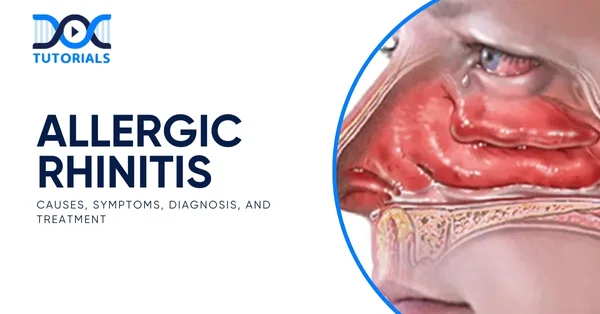Allergic Rhinitis: Causes, Symptoms, Diagnosis, and Treatment

Allergic rhinitis (AR) is an atopic disorder with the clinical symptoms of nasal congestion, sneezing, postnasal drip, and nasal pruritus. It affects 1 out of every 6 people and is characterised by high morbidity and productivity loss. Formerly, AR was considered a disease process that selectively involves the nasal airway.
AR may be perennial (chronic) or seasonal (intermittent), and about 20% are seasonal, 40% perennial, and 40% have both components. Awareness about the aetiology, presentations, and risk factors of allergic rhinitis is essential to facilitate early intervention and good long-term care.
Moreover, if you are a NEET PG medical student, it is vital that you know about this condition to assist you in building your clinical knowledge base and enhancing patient care. Keep reading to find out more!
What is Allergic Rhinitis?
Allergic rhinitis, also known as hay fever is a condition that causes symptoms similar to those of a cold. It could be a runny nose, watery eyes, sneezing, and sinus pressure. But, unlike a cold, hay fever is not due to a viral infection.
It is somewhat due to an allergic reaction against harmless indoor or outdoor agents that the immune system mistakenly identifies as threats (allergens). For those new to medical terms, understanding rhinitis meaning can help clarify that it refers to inflammation of the nasal mucous membranes.
Typical allergens that cause hay fever are pollen and dust mites. Another allergen is animal dander, or tiny bits of animal skin in animals with feathers or fur (dogs, birds, and cats), which is also known to cause allergy.
In addition to being uncomfortable, hay fever can disrupt daily activities, slow down the work or school performance, and overall affect quality of life. However, it is possible to avoid the stimuli and apply good remedies to minimise symptoms.
What Causes Allergic Rhinitis?
Allergic rhinitis develops when the immune system in the body reacts to particles in the air that are otherwise harmless. They are small and easy to breathe in through the nose or mouth. In individuals with hay fever, the body incorrectly recognises these particles as dangerous invaders.
It reacts by discharging chemicals into the blood, primarily histamine. This chemical leads to swelling and irritation of the nasal mucous membranes, eyes, and throat as the body tries to get rid of the allergen.
Some common allergens responsible for initiating allergic rhinitis are:
- Dust mites in carpets, curtains, bedding, and upholstered furniture
- Pollen from grass, trees, and weeds
- Pet dander (small skin particles)
- Mold spores
- Cockroaches (saliva and faeces)
Food allergies, in some instances, can lead to swelling and inflammation within the throat and nose. Since food allergy is potentially life-threatening or severe, if you suspect that a food is continually triggering allergy symptoms, get medical care right away.
What are the Risk Factors of Allergic Rhinitis?
You can get allergies, but your risk is greater if you have a family history of allergic disease. Asthma or atopic eczema also raises the risk for allergic rhinitis. Certain things in the environment trigger the symptoms, such as:
- Cigarette smoke
- Strong chemicals
- Cold temperatures
- Humidity
- Wind
- Air pollution
- Hairspray
- Perfumes
- Colognes
- Wood smoke
- Industrial fumes
What are the Symptoms of Allergic Rhinitis?
Common manifestations of allergic rhinitis are:
- Sneezing
- Runny nose
- Stuffy nose
- Itchy nose
- Coughing
- Sore or scratchy throat
- Itchy eyes
- Watery eyes
- Dark circles under the eyes
- Frequent headaches
- Eczema-like symptoms, such as dry, itchy skin that oozes and blisters
- Hives
- Excessive fatigue
The symptoms usually emerge within minutes of exposure to an allergen. Others, like headaches and fatigue, can happen on repeated exposure. Fever is not a sign of hay fever.
For some, symptoms will only develop now and then and usually after heavy exposure to an allergen. For others, they will develop throughout the year. If your symptoms persist longer than several weeks, call a doctor to determine if allergies are the cause.
What is the Diagnosis of Allergic Rhinitis?
If your symptoms are not severe, your doctor will have to conduct only a physical exam. Some tests will be advised to help with establishing the most effective treatment and prevention for your situation. One of the most common tests are:
- Skin Prick Test: In this test, your provider applies small amounts of potential allergens to your skin to observe your body’s reaction. If you’re allergic, a small, raised red bump typically appears at the site.
- Blood Test, or Radioallergosorbent Test (RAST): It is a measurement of the amount of specific IgE (immunoglobulin E) antibodies to specific allergens in your blood.
What is the Treatment for Allergic Rhinitis?
The best treatment for allergic rhinitis is to avoid contact with the causative allergens, like pollens. Although it is not always possible to stay away from pollen entirely, some precautions can be taken to limit exposure.
Your doctor might also prescribe you medications based on your signs, your age, how severe they are, and if you have any other illness like asthma.
For mild cases, performing a nasal rinse may expel mucus from your nasal cavity. The following are some other allergic rhinitis treatments:
- Antihistamines
These medications are highly effective for controlling allergy symptoms and are often used when symptoms are infrequent or short-lived. Keep in mind that:
- Oral antihistamines are commonly over-the-counter.
- Some induce drowsiness; avoid driving or using machines after their intake.
- Others have been designed to induce minimal or no drowsiness.
- Nasal sprays of antihistamines can be highly effective; talk to your doctor to know whether these need to be the first choice.
- Antihistamine drops for the eyes can treat itchy, watery eyes as needed.
- Corticosteroids
Nasal corticosteroid sprays are the best medication for allergic rhinitis. They are most effective with continuous use but are also helpful for short-term or intermittent treatment. They are:
- Safe for both children and adults.
- Most are available over-the-counter, though some are prescription drugs.
- Decongestants
These are helpful in alleviating nasal congestion. However, do not use nasal spray decongestants for more than three straight days to avoid rhinitis medicamentosa, a condition caused by overuse.
- Other Medications
Other medications, like leukotriene inhibitors, are prescription medications that prevent chemicals (leukotrienes) produced during an allergic attack from functioning. These medications’ side effects can include depression or anxiety in some patients. If you have a history of mental illness, speak with your health care provider first before using them.
- Allergy Shots
Also known as immunotherapy, they can be prescribed if avoidance of the allergen is impossible and the symptoms are hard to control. It involves repeated injections of the allergen in gradually increasing doses over time to the extent of reaching the desired amount to control the symptoms.
This is considered an allergic rhinitis medical procedure that helps your immune system acclimate over time and reduce its reaction.
- Sublingual Immunotherapy Treatment (SLIT)
A substitute for injections, SLIT consists of a medication administered under the tongue. It is most frequently effective with grass and ragweed allergies.
Usually, symptoms of allergic rhinitis are manageable with medications. In severe cases, allergy shots may be necessary. Some people, particularly children, may outgrow their allergies as their immune systems become less reactive. However, once an allergen such as pollen triggers an allergy, it often continues to affect the individual long-term.
FAQs About Allergic Rhinitis
- How long does allergic rhinitis last?
For most, symptoms clear within a few days. In individuals with allergies, rhinitis may be chronic – meaning it persists or returns frequently. When allergen exposure continues, symptoms can last for weeks or even months.
- Do antibiotics help allergic rhinitis?
Antibiotics, which treat bacterial infections, are not effective for uncomplicated colds (viral infections) or for noninfectious rhinitis, such as allergic rhinitis.
- What are the risks of allergic rhinitis?
Allergic rhinitis patients are also at increased risk for the development of asthma and other allergic diseases. There is a risk of chronic sinusitis, sleep disorders (snoring), and otitis media.
- Is allergic rhinitis lifelong?
In most people, allergic rhinitis is a non-episodic disease that varies in severity during life. It is manageable to a great extent by altering one’s lifestyle, medication, and immunotherapy.
Conclusion
Allergic rhinitis symptoms can disrupt your daily life and the quality of life, but there are treatments available. Millions of adults and children control this condition with a regimen of medications and lifestyle changes.
For medical students aspiring to crack the NEET PG exam, it is essential to understand medical ailments like allergic rhinitis. That’s where DocTutorials becomes your guide, providing professional video tutorials, quick revision courses (QRPs), and comprehensive study notes to excel in the subject.
Join DocTutorials today and explore our NEET PG course to excel in your medical career.
Latest Blogs
-

NEET PG Exam 2025- Date, Pattern, Marking Scheme, Subject Wise Weightage, and Exam Mode
NEET PG Exam 2025 is the ultimate gateway for medical graduates aspiring to pursue postgraduate courses in medicine, including MD,…
-

INI CET Exam 2025: Your Roadmap to Success – Key Topics, Strategies, and Lessons from Last Year’s Papers
The INI CET exam is more than just a test; it’s a significant milestone for many medical students aiming to…
-

INI CET Exam Success: Previous Year Question Papers & Ultimate Guide – INI CET PYQ
One can feel overwhelmed while preparing for the INI CET (Institute of National Importance Combined Entrance Test). A vast syllabus,…




